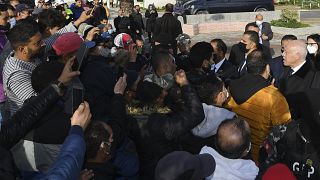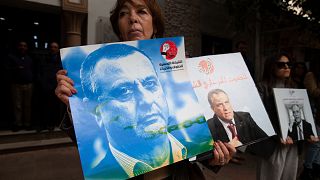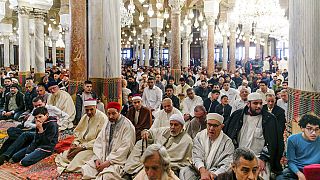Tunisia
Hundreds of demonstrators took to the streets of Tunisian cities on Saturday to protest police repression, corruption and poverty, following several nights of unrest marked by clashes and arrests.
Saturday's protests come as the North African nation struggles to stem the novel coronavirus pandemic, which has crippled the economy and threatened to overwhelm hospitals.
Over 6,000 people have died from Covid-19 in Tunisia, with a record 103 deaths reported on Thursday.
The government on Saturday extended a night-time curfew from 8 p.m. (1900 GMT) to 5 a.m. and banned gatherings until February 14.
But protesters took to the streets in several parts of the country, including the capital Tunis and the marginalised interior region of Gafsa, to demand the release of hundreds of young people detained during several nights of unrest since January 14.
"Neither police nor Islamists, the people want revolution," chanted demonstrators in a crowd of several hundred in Tunis, where one person was wounded in brief clashes amid a heavy police presence.
Protests were also held in the coastal city of Sfax on Friday.
Much of the unrest has been in working class neighbourhoods, where anger is boiling over soaring unemployment and a political class accused of having failed to deliver good governance, a decade after the 2011 revolution that toppled long-time dictator Zine El Abidine Ben Ali.
Economic misery exacerbated by novel coronavirus restrictions in the tourism-reliant nation have pushed growing numbers of Tunisians to try to leave the country.
"The situation is catastrophic," said Omar Jawadi, 33, a hotel sales manager, who has been paid only half his salary for months.
"The politicians are corrupt, we want to change the government and the system."
The police have said more than 700 people were arrested over several nights of unrest earlier this week that saw young people hurl rocks and petrol bombs at security forces, who responded with tear gas and water cannon.
Human rights groups on Thursday said at least 1,000 people had been detained.
"Youth live from day to day, we no longer have hope, neither to work nor to study -- and they call us troublemakers!" said call centre worker Amine, who has a degree in aerospace engineering.
"We must listen to young people, not send police in by the thousands. The whole system is corrupt, a few families and their supporters control Tunisia's wealth."
Tunisia last week marked one decade since Ben Ali fled the country amid mass protests, ending 23 years in power.
Tunisia's political leadership is divided, with Prime Minister Hichem Mechichi waiting for parliament to confirm a major cabinet reshuffle announced last Saturday.











01:15
Tunisian President Saied dismisses prime minister amid political tensions
01:15
One year of conflict: pro-Palestinian protest held in Tunisia
01:30
Tunisians protest poor governance as election campaigns get underway
Go to video
Tunisians set to protest against authoritarianism ahead of upcoming presidential election
01:07
Tunisia: Submission of documents by presidential hopefuls starts
01:54
Tunisia: pro-Saied demonstrations held, alongside counter-protest